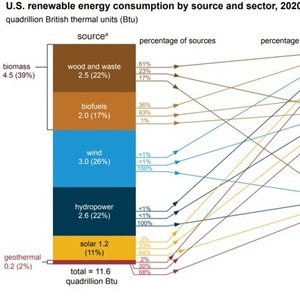Biofuels account for 17% of US renewables consumption in 2020

June 16, 2021
BY Erin Krueger
The U.S. consumed a record 12 percent of renewable energy in 2020, according to data released by the U.S. Energy Information Administration on June 16. Biofuels announced for approximately 17 percent of renewables.
According to the EIA, consumption of renewable energy in the U.S. grew for the fifth consecutive year in 2020, reaching a record high of 11.6 quadrillion British thermal units (Btu), or 12 percent of total U.S. energy consumption. Renewable energy was the only source of U.S. energy consumption that increased in 2020 from 2019; fossil fuel and nuclear consumption declined.
Advertisement
Advertisement
EIA data shows that biofuels, including fuel ethanol, biodiesel and other renewable fuels, accounted for approximately 17 percent of U.S. renewable energy consumption last year despite an 11 percent drop in biofuel consumption caused by market factors associated with the COVID-19 pandemic.
Wood and waste energy, including wood, wood pellets, and biomass waste from landfills, accounted for about 22 percent of U.S. renewable energy consumption last year. The EIA noted that industrial, commercial and electric power facilities use wood and waste as a fuel to generate electricity, produce heat and manufacture goods.
Advertisement
Advertisement
Related Stories
XCF Global Inc. on July 8 provided a production update on its flagship New Rise Reno facility, underscoring that the plant has successfully produced SAF, renewable diesel, and renewable naphtha during its initial ramp-up.
The U.S. EPA on July 8 hosted virtual public hearing to gather input on the agency’s recently released proposed rule to set 2026 and 2027 RFS RVOs. Members of the biofuel industry were among those to offer testimony during the event.
The USDA’s Risk Management Agency is implementing multiple changes to the Camelina pilot insurance program for the 2026 and succeeding crop years. The changes will expand coverage options and provide greater flexibility for producers.
EcoCeres Inc. has signed a multi-year agreement to supply British Airways with sustainable aviation fuel (SAF). The fuel will be produced from 100% waste-based biomass feedstock, such as used cooking oil (UCO).
President Trump on July 4 signed the “One Big Beautiful Bill Act.” The legislation extends and updates the 45Z credit and revives a tax credit benefiting small biodiesel producers but repeals several other bioenergy-related tax incentives.
Upcoming Events










